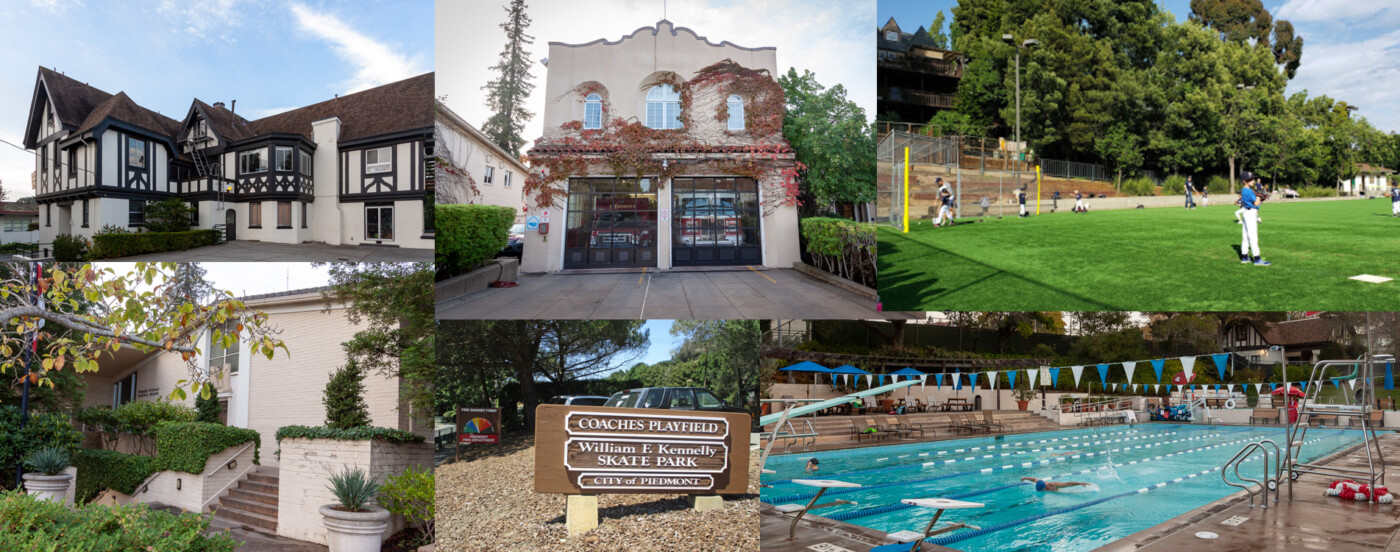The City of Piedmont needs to prepare, as soon as possible, for spending on big capital projects through a combination of debt financing and raising the city’s real property transfer tax rate, according to a new report from the city’s Budget Advisory and Financial Planning Committee.
In response, Piedmont City Council members pledged Monday that city staff will move quickly to get precise cost estimates for the work that debt financing — likely a bond measure — would pay for, and begin a public outreach campaign to show voters the importance of taxing themselves in this fashion.
Critical facilities in need of complete overhaul
The report was presented to the City Council Monday night by Bill Hosler, chairman of the city’s Budget Advisory and Financial Planning Committee. The report identifies the city’s police and fire stations as most in need of replacement or overhaul, describing them as old, cramped, seismically unfit and generally inadequate. In addition, several other aging city facilities, including the Piedmont Community Pool, the Linda Beach Playfield and Park and the Veterans Memorial Building, Coaches Field and the Recreation Department building, face major work, or replacement, in the next several years. Streets and sidewalks would also fall under these maintenance needs.
The total cost for all the recommended work, the report says, is somewhere between $53.9 million and $76.5 million.
Hosler told the council Monday that while Piedmont has done a good job in recent years tackling most major long- and short-term budget issues, it hasn’t taken steps to firmly address these facility needs.
The report says that has to change. “The committee believes it is inadequate financial stewardship to continue to plan for underfunding the year-to-year depreciation that occurs in the city’s infrastructure — even with brand new facilities — and to not plan for their substantial repair/replacement,” according to a passage in the committee’s report, presented Monday night.
A possible tax measure
The report mentions two types of bonds the city could issue for funding for the capital project and maintenance work. One is a general obligation bond, repaid through “ad valorem” taxes on real property in the city. The other type of bond mentioned, and the one the finance committee recommends, is community facilities district bonds. For this type of bond issue, the city would form an assessment district (citywide in this case), and bonds would be repaid through an assessment on each property in the district.
Taking advantage of low interest rates
The report also urges the city to move as quickly as possible with a decision, to take advantage of current low long-term interest rates.
The Budget Advisory and Financial Planning Committee report also says Piedmont’s facilities maintenance fund, established in 2003 to address ongoing and deferred maintenance of city-owned facilities, has very little planned funding within the current 2019-2020 budget year, which ends June 30. The fund needs approximately $850,000 per year just to maintain the existing condition of city buildings, parks, streets and sidewalks, much less perform meaningful upgrades and improvements.
The role of transfer taxes — and a possible increase
The committee report suggests Piedmont could increase its real property transfer tax rate to raise critically needed funding for major capital projects. This tax is paid when a property is sold, generally (but not always) by the seller.
Piedmont’s current real property transfer tax rate is lower than both Berkeley and Oakland, but higher than most other cities in California.
“An increase in the transfer tax rate …. would provide additional funding for facilities maintenance while impacting a minimal number of residents on a one-time basis,” the report said. While transfer tax revenue is inconsistent, dependent on the volatile nature of real estate sales activity, the report says transfer tax income is a good funding source over the long haul for replenishing a facilities maintenance fund. A good funding level, the report says, is $700,000 to $900,000 annually.
Though more exactitude about the needed facilities work is required before voters are asked to approve taxing themselves, City Administrator Sara Lillevand said, “I think we have a much clearer picture than we did two years ago of what has to happen and when.”
Public outreach and education needed
Mayor Bob McBain urged all involved to get the needed information for seeking a bond measure, and to get a messaging campaign started, as soon as possible.
“This is a very big deal for the city of Piedmont,” McBain said. “It’s a big lift here.”
A copy of the finance planning committee report, which McBain called “a primer on taxation in Piedmont” and an essential read for residents, can be viewed HERE.
